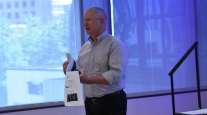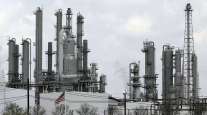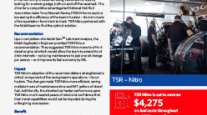California, 7 Port Terminal Operators Settle Lawsuit Over Diesel Emissions
This story appears in the Aug. 22 print edition of Transport Topics.
California’s attorney general announced a settlement last week with seven Southern California port terminal operators to resolve the state’s claims that residents near the ports were exposed to dangerous levels of diesel exhaust from the terminals.
As part of the settlement, the seven operators at the Port of Los Angeles and Port of Long Beach, the nation’s two largest ports, agreed to spend $1 million each on emissions reduction efforts and a total of more than $1 million to support truck emissions reduction programs.
The settlement is the latest development in a series of court actions relating to emissions, ports and transportation. Separately, American Trucking Associations’ lawsuit to block implementation of some parts of Los Angeles’ truck emissions reduction program currently is being reviewed by a U.S. Court of Appeals.
The defendants included APM Terminals Pacific Ltd., Eagle Marine Services Ltd., International Transportation Service Inc., SSA Terminals LLC, TraPac Inc., West Basin Container Terminal and Yusen Terminals Inc. The lawsuit settlement was reached in Los Angeles.
Attorney General Kamala Harris sued the terminal operators in June, claiming they were violating state law by failing to notify residents near the ports of the health dangers posed by diesel exhaust.
“This settlement will speed the requirements for port terminals to reduce diesel emissions,” said Harris in a statement. “This is vitally important because expanding port traffic leads nearby residents to be exposed to polluted air, and increased risk of cancer and other diseases.”
Laura McCaskle, a Los Angeles attorney who represented the terminal operators, declined to comment. None of the individual defendants responded to a request for comment.
Diesel exhaust in ocean terminals is generated by vessels, cranes, trucks and rail locomotives that transfer containers between ships and inland transportation carriers.
The terminal operators include both subsidiaries of international cargo lines such as Maersk Line and operators such as SSA that provide container transfer services to ocean carriers on a contract basis.
The payments to the ports include $756,000 to Los Angeles to help support its Clean Trucks program and $320,400 to Long Beach to advance a demonstration project for fuel cell/plug in tractors. The terminal operators also were assessed $540,000 in civil penalties.
Among the emissions reduction steps that the terminal operators promised to take were using electric instead of diesel-powered cranes, retrofitting of ships to use electric power instead of diesel while in port and using lower-emission gasoline-powered yard tractors.
In addition to the payments, all of the terminal operators will have to issue warnings about diesel exhaust’s dangers in advertisements that will be placed in newspapers, at bus shelters and on the Internet.
Harris’ office earlier this year filed a friend of the court brief in support of Los Angeles’ Clean Truck Program that is being challenged by ATA.




